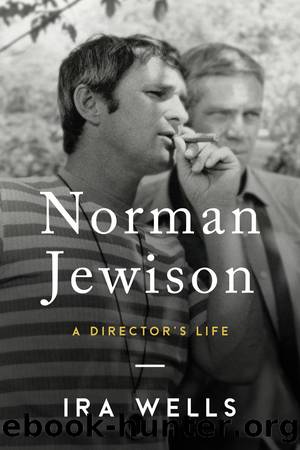Norman Jewison: A Director's Life by Ira Wells

Author:Ira Wells [Wells, Ira]
Language: eng
Format: epub
Tags: Biography & Autobiography, Entertainment & Performing Arts, Performing Arts, Film, History & Criticism, Television, Direction & Production
ISBN: 9781989555385
Google: V2fAzQEACAAJ
Publisher: Sutherland House Incorporated
Published: 2021-05-18T23:19:03.845953+00:00
CHAPTER 11
Super Double Dynamite
Love and a Couple
Tons of Peace
JEWISON SOON SETTLED INTO THE RHYTHMS of English life. It must have felt comforting, for an Anglo-Canadian of Jewisonâs generation who had grown up singing âGod Save the Kingâ each morning before school, to be surrounded by the familiar symbols and ritual. âNorman really belonged in Putney Heath,â said his friend Gary Smith, who met Jewison on the CBS Hit Parade in 1958. âHe was a mayor of Putney Heath. He loved going out with his dog in that tall grass and running around. He loved that period of his life.â Smith remembers the mouthwatering omelets that were Normanâs breakfast specialty.1 The family also spent time outside the city (âliving as the local Squire,â Jewison said) near Henley-on-Thames, northeast of Reading. âItâs beautiful in the country and the children are running around and I am gardening like mad. Love it!!â he wrote to his friend Chiz Schultz. âThis is truly a civil country so far.â2
Jewisonâs praise of England as âcivilâ hints at what perturbed him about his American life. Friends said that Norman and Dixie worried about their kids growing up in Los Angeles. As their friend Henry Mancini explained, âthe Californian environment tends to⦠I donât know. It has an effect. It has a laidback effect. Itâs not like growing up on the streets of New York or anything like that. Itâs a little detached from the real world.â Mancini, along with all of Normanâs friends, felt the Jewison kids had turned out to be remarkably well-adjustedâwhich he attributed to âhaving the discipline laid on themâ during their time in England.3
For her part, Jennifer Jewison doesnât remember those years as draconian. Her father wasnât uptight about boys or drugs or other typical sources of parental angst. âI mean, he knows that we all smoke potâhe smokes pot. He canât really say much about it because we know he does it, you know, I mean Iâve found pot in his room.â
Soon after Fiddler wrapped, Jewison left for a couple of weeks to Klosters, Switzerland, where he could ski âout all my hostilities and fatigue and depression and feel almost whole again.â He often bottomed-out after finishing a film, and Fiddler had been particularly arduous. âAfter all the delays,â he wrote to Ashby, alluding to his standoff with the studio, âand the return to Yugoslavia, I still missed the fucking snow. It had melted five days before we returned and got nothing but bright sunshine so I had to scramble around and wait for clouds and so on trying to get as bleak a feeling as possible. I must say Iâm glad it is over. After seven continuous months I was beginning to feel my age. It really has been a brute of a film to shoot.â
Jewisonâs move to the UK had necessitated a new logistical approach to film production. Fiddler would provide the template for future projects. He would avoid British studios, which he found âtoo slow, hampered as they are by tradition, management-union hostility, reluctance to work past the hour and tea breaks.
Download
This site does not store any files on its server. We only index and link to content provided by other sites. Please contact the content providers to delete copyright contents if any and email us, we'll remove relevant links or contents immediately.
Kathy Andrews Collection by Kathy Andrews(11839)
The remains of the day by Kazuo Ishiguro(9002)
Spare by Prince Harry The Duke of Sussex(5200)
Paper Towns by Green John(5194)
The Body: A Guide for Occupants by Bill Bryson(5100)
Industrial Automation from Scratch: A hands-on guide to using sensors, actuators, PLCs, HMIs, and SCADA to automate industrial processes by Olushola Akande(5063)
Machine Learning at Scale with H2O by Gregory Keys | David Whiting(4314)
Be in a Treehouse by Pete Nelson(4055)
Never by Ken Follett(3960)
Harry Potter and the Goblet Of Fire by J.K. Rowling(3864)
Goodbye Paradise(3812)
The Remains of the Day by Kazuo Ishiguro(3414)
Into Thin Air by Jon Krakauer(3402)
Fairy Tale by Stephen King(3401)
The Cellar by Natasha Preston(3347)
The Genius of Japanese Carpentry by Azby Brown(3310)
120 Days of Sodom by Marquis de Sade(3276)
Reminders of Him: A Novel by Colleen Hoover(3123)
Drawing Shortcuts: Developing Quick Drawing Skills Using Today's Technology by Leggitt Jim(3084)
